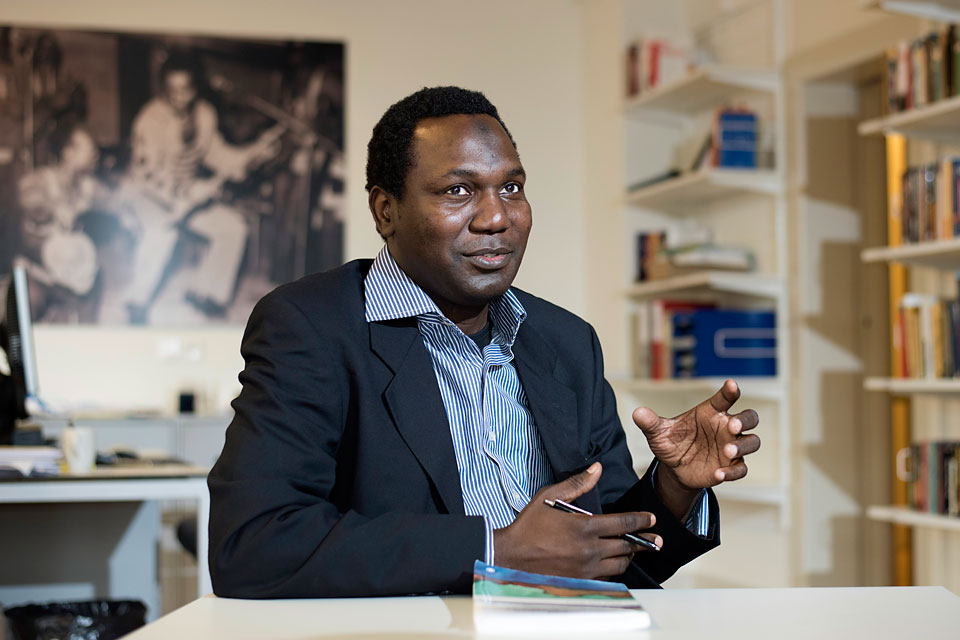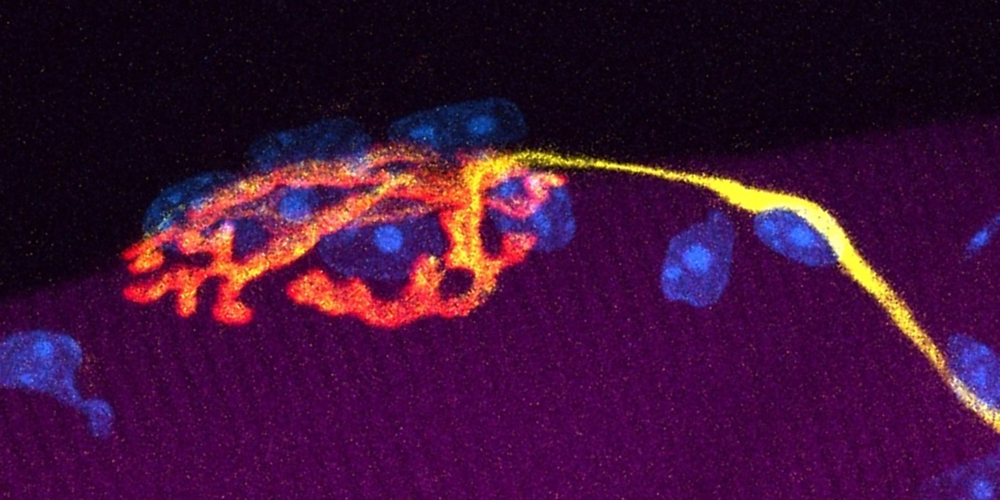“The flow of money and arms must be stopped”
Boko Haram extremists have brought a wave of violence to northern Nigeria and Cameroon. The historian Dr. Adama Ousmanou, a visiting scientist at the Center for African Studies of the University of Basel, explains the causes of the bloody conflict, which spans domestic power struggles, local elites and international terrorist networks.
16 February 2015
Reports of attacks, fighting and kidnappings in northern Nigeria, centered around the terrorist group Boko Haram, create headlines in international news almost every day. Where does militant Islamism stem from in Nigeria?
The history of Islam around the area of Lake Chad goes back centuries. In the 19th century a jihad movement was committed to a “pure Islam”. Its leader, Usman dan Fodio, fought against the ancient hausa kingdoms and states in the region ending up with the establishment of the Sokoto Caliphate, which covered a large part of present-day northern Nigeria and Cameroon. During colonial times, the British sat up the indirect rule through Sokoto emirs and other subjugated states. At the same time, Muslim brotherhoods emerged and played an important role in the political mobilization of the population behind elites in their power conquest process – even today, political leaders must have the support of the brotherhoods in order to establish themselves in northern Nigeria.
Can the emergence of Boko Haram be traced back to this time?
Since independence in 1960, militant movements that fight state rule and advocate the introduction of Sharia and a “pure Islam” have emerged regularly. These movements refer themselves to the jihad movement of the 19th century. They are active particularly in the poorer regions of the north and target the educated elite. Time and again, conflicts have turned violent. One of the more recent of these movements is the Jama'atu Ahlis Sunna Lidda'awati wal-Jihad (Arabic for “People Committed to the Propagation of the Prophet’s Teachings and Jihad”). They emerged around 2001 and the terrorist group is more widely known under the name of Boko Haram (loosely translated: “western education is forbidden”). In 2009, the state decided to take action against Boko Haram. Up to that point, the movement had not been openly violent but was already perceived as a threat. However, bloody riots and the arrest and shooting of leader Mohammed Marwa led to the radicalization of the organization and the escalation of violence.
How did the current conflict escalate? How does Boko Haram differ from previous Islamist movements?
In this conflict ethnicity, religion and political power are playing an important role and can be considered as weapons. Developments in the national politics thus play a crucial role. Since the end of the last military regime in 1999, the People’s Democratic Party (PDP) has governed Nigeria. The country was – and still is – marked by a deep-rooted conflict between the overwhelmingly Muslim north and the south, where Christianity and traditional African religions prevail. To address this issue, the party developed a “zoning system” in which important governmental offices, in particular the presidency, would rotate between the different religious, regional and dominant ethnic groups every eight years. Accordingly, the first President Olusegun Obasanjo from the south was succeeded in 2007 by the Muslim Umaru Yar'Adua. After he passed away, Vice-President Goodluck Jonathan from the south took office. His run for the presidency in the 2011 elections was regarded by many Muslims as a violation of the “zoning system”. The PDP lost by a massive margin in the north, and when Jonathan was yet reelected this led to great upheaval as well as to attacks by Boko Haram. The group’s “success” since 2011 can definitely be attributed to these events. Some observers even accused parts of the political elite in the north of having supported Boko Haram during those times. Moreover, Jonathan is looking forward to running again in the 2015 presidential elections, adding more fuel to the fire. The fact that the chaotic situation in the north renders a regular vote nearly impossible puts him at an advantage.
Do other factors aggravate the conflict?
Boko Haram not only attacks the central government and Christians, but also increasingly targets local elites, authorities and institutions in the north, which have been accused of collaborating with the Christian and the allegedly “westernized” south. At the same time, Boko Haram is associated with the Kanuri ethnic group and regarded as a threat to the dominant Hausa-Fulani in the north.
But all this still does not explain the escalation of violence.
After the death of Mohammed Marwa, Boko Haram has radicalized continuously under its new leader Abubakar Shekau. What played an important part in these developments besides the repression was Boko Haram’s international network. The group has links to Al-Qaeda in the Maghreb and Al-Shabab in Somalia, and, according to the Nigerian government, the sect receives financial support from Middle Eastern countries, such as Qatar and Saudi Arabia, as well as from individuals in Pakistan and the UK. Boko Haram has modern weapons and is partially better equipped than the Nigerian army itself. But most importantly, Boko Haram’s immense financial resources have taken this conflict to a whole new dimension. Young men earn up to CHF 60 a day for taking part in attacks – and surviving them. That is a lot of money in an area where there are almost no jobs, terrible poverty and few prospects; in some cases even non-Muslims fight for Boko Haram.
The conflict is spilling across borders, above all to northern Cameroon. Is there potential for a similar escalation of violence in Cameroon?
The conflict in Nigeria is very problematic for Cameroon, as its border is long and porous. However, the conditions inside Cameroon are different to those in Nigeria. Although Boko Haram has branches in Cameroon, its stance there is weaker, since it has to share its influence with other important Muslim brotherhoods. Moreover, there is a better balance between the ethnic groups in Cameroon. However, the effects of the conflict can be felt in domestic politics and the government under President Paul Biya has intensified legislation against terrorism. It has also exploited the fear of Boko Haram to further limit political and anti-government activities.
Where do you see solutions to stop the cycle of violence in the region?
The governments concerned must work together to find solutions. On its own, Nigeria will not be able to solve this problem. By now Nigeria and its neighboring countries of Chad, Niger and Cameroon have established common military action; however, this has taken far too long. First of all, the flow of money and arms, which mainly comes through Libya, Mali and Chad, must be stopped. The assistance of the international community is essential in this case. At the same time, negotiations with the Islamists are necessary in order to identify and locate them – the past has shown that negotiations can produce results. However, the most important factor is to improve the standard of living in the affected areas over the long term and to give people a better perspective. This requires functioning education and healthcare systems, and above all jobs.
From Japan to Switzerland
During his PhD, Adama Ousmanou worked as a guest researcher at Nagoya University in Japan. At the institute, which focuses on comparative methods in humanities and social sciences, he met researchers from Zurich and Geneva. “They introduced me to the Center for African Studies and the work of professors Elísio Macamo and Till Förster,” he explained. “Here in Basel, I have the opportunity to work with researchers interested in the relationship between politics and religion, and strengthen ties with fellow researchers in Zurich and Geneva.”
Dr. Adama Ousmanou obtained his doctorate from the Université de Ngaoundéré in Cameroon in 2012 and works as a postdoctoral fellow at the University of Maroua, Cameroon, covering religious and ethnic tensions around Lake Chad. He is currently conducting research with a grant from the Swiss Federal Commission for Scholarships for Foreign Students (FCS) at the Center for African Studies Basel.



